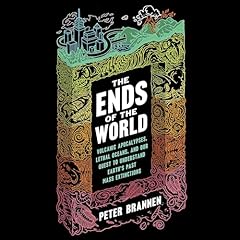
The Cretaceous Period
The History and Legacy of the Geologic Era That Ended with the Extinction of Dinosaurs
No se pudo agregar al carrito
Add to Cart failed.
Error al Agregar a Lista de Deseos.
Error al eliminar de la lista de deseos.
Error al añadir a tu biblioteca
Error al seguir el podcast
Error al dejar de seguir el podcast
 Exclusivo para miembros Prime: ¿Nuevo en Audible? Obtén 2 audiolibros gratis con tu prueba.
Exclusivo para miembros Prime: ¿Nuevo en Audible? Obtén 2 audiolibros gratis con tu prueba.Compra ahora por $9.76
-
Narrado por:
-
Gregory T. Luzitano
Scientists have long attempted to understand Earth’s past, and in service to that effort, they have divided the world’s history into eons, eras, periods, epochs, and ages. For example, the current eon is called the Phanerozoic Eon, which means “visible life”. This is the eon in which multicellular life has evolved and thrived. Before this, life was microscopic (single cells).
The Phanerozoic eon is divided into three eras - Paleozoic (“old life”), Mesozoic (“middle life”), and Cenozoic (“new life”). The Mesozoic era is divided into three periods - Triassic, Jurassic, and Cretaceous.
Before the Triassic, primitive life had built up in the oceans and seas, and some lifeforms finally had crawled onto land during the Paleozoic era. With that, life had become well-established, but then came the Permian-Triassic mass extinction, the worst extinction event in the history of the planet.
At the end of the Triassic, another extinction event cleared the way for dinosaurs to become the dominant set of species in the Jurassic. Though the Triassic does not have as interesting a list of creatures as those in the Jurassic and Cretaceous - such as Tyrannosaurus rex, Stegosaurus, Pterodactyls, Brontosaurus, and the like - the life which reclaimed the Earth and then thrived during this period was no less important. Life during the Triassic spent nearly 60 percent of its time recovering from the Permian-Triassic extinction event, roughly 30 million years. What had been built up was then slammed by nature, effectively clearing the board once more for new species to take over.
The Jurassic is best known, thanks to the series of dinosaur movies featuring its name, but the famous extinction of the dinosaurs took place during the Cretaceous. One of the problems of discussing the ancient history of the Earth is the unimaginably long spans of time involved. People tend to think of human history as old, but compared to other periods of the evolution of the planet, humans have been around for no more than the blink of an eye.
Anatomically, modern people have been around for about 200,000 years, and while that may sound like a long time, it can be put in context if the whole history of the planet, from the time that it was first formed until the present day, covered a period of 24 hours. In that timescale, modern humans first appeared a little after 23:59:59, less than one second before midnight, and recorded human history - the point from when people first started writing things down - started less than 6,000 years ago.
Despite people’s current ability to impact the planet and denude its resources, they represent a tiny blip in the history of the Earth, though the understanding of this is a relatively recent phenomenon. For much of recorded history, people imagined that human history and the history of the planet were pretty much the same thing. It was assumed that people had always been the dominant life on Earth.
Early societies were aware of fossils, but they had no conception of just how old they were; the ancient Chinese, for example, classified many fossils as the bones of dragons. It wasn’t until 1822 that a new word “paleontology” was coined, and it was used to describe the emerging science of using the fossil record to understand what the world was like in the far distant past.
Gradually, a better understanding emerged of the different periods through which the Earth had passed and a realization that for hundreds of millions of years, it wasn’t humans, but a very different species that ruled the Earth.
©2020 Charles River Editors (P)2020 Charles River EditorsLos oyentes también disfrutaron:




















I’m a geologist, and this is always recommended reading/listening by me, and I enjoy them a lot. Give this book, as well as the series, a listen if you truly love Dinos and want to learn about them outside of the pop culture norm.
Informative and is well written and read.
Se ha producido un error. Vuelve a intentarlo dentro de unos minutos.


